What should be the rate of court fee in cassation: UNBA's position
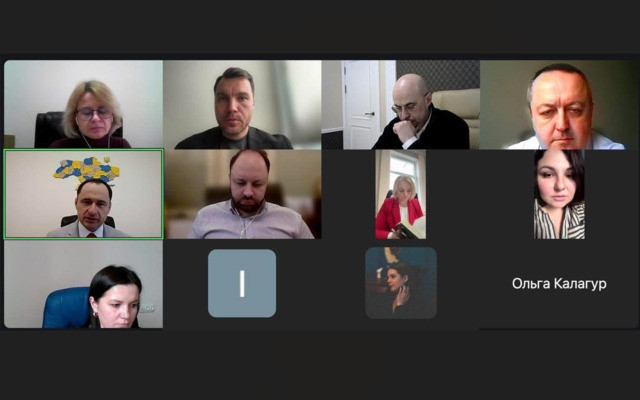
For filing a cassation appeal to the court, it is advisable to establish a court fee rate significantly lower than 200%, which will reflect the nature and scope of procedural actions carried out by the Supreme Court.
This position of the Ukrainian National Bar Association was voiced by the Chairman of the UNBA Committee on Customs and Tax Law Yakov Voronin during the discussion of the initiative to prepare a draft law aimed at implementing the decision of the Constitutional Court No. 2-р(ІІ)/2025 on access to the court of cassation in civil proceedings. The event was organized by Maksym Dyrdin, Chairman of the Subcommittee on Political Reform and Constitutional Law of the Verkhovna Rada Committee on Legal Policy.
As a reminder, on January 20, 2025, the Constitutional Court declared unconstitutional the provision of subpara. 7, clause 1, part 2, Article 4 of the Law «On Court Fee», according to which the court fee for filing a cassation appeal against a court decision is set at 200 percent of the rate that was payable when filing a statement of claim, other application and complaint in the amount of the disputed amount.
According to the UNBA, a differentiated approach to setting court fees is logical:
- the court of first instance considers the case on the merits, examines evidence, establishes factual circumstances, which determines the basic rate of court fees (100%);
- the court of appeal has a dual function: it both verifies the legality of the first instance decision and can examine new evidence and reassess the existing evidence, which justifies the increased court fee rate (150%);
- the court of cassation exclusively checks the correct application of substantive and procedural law without examining evidence and establishing the actual circumstances of the case, which justifies the lowest court fee rate of 50% of the base rate.
Such an approach will not only take into account the actual workload of the cassation instance, but also ensure compliance with the standards of access to justice guaranteed by the Convention for the Protection of Human Rights and Fundamental Freedoms.
The Constitutional Court noted that the law should determine the procedure for setting the rate that would ensure a fair balance between the interests of the state and the individual. To reinforce this approach, it is advisable to enshrine the following principle
«The amount of court fees for applying to court must be reasonable and determined taking into account the need to ensure that each person has a real opportunity to exercise the right to judicial protection. The court fee rates shall be established by law in accordance with the principle of fairness and reasonableness, taking into account the balance between the financing of the judicial system and the accessibility of court proceedings for all persons wishing to exercise their constitutional right to protect their rights and interests in court».
«The amount of court fees for different instances should reflect the real scope of procedural actions performed by the court in the course of consideration of the case and should not create disproportionate obstacles to access to justice at any stage of the trial».
This provision is in line with the case law of the European Court of Human Rights, which has repeatedly emphasized that the amount of court fees should not constitute an excessive burden for the applicant and create an actual obstacle to access to court.
Following the discussion of the proposals, it was agreed to develop a basic draft law that would introduce a reasonable limit on the amount of court fees. It will be tied to the level of the subsistence minimum for able-bodied persons to avoid excessive financial burden on citizens. It is also planned to introduce benefits for certain categories of people who do not have the financial means to pay the court fee.
The participants of the event also agreed that it is impossible to amend the Law «On Court Fees» directly without prior amendments to the procedural codes.
Therefore, it is first necessary to amend Art. 136 of the Civil Procedure Code, which sets out the form and requirements for an application for a court fee exemption, deferral or installment plan.
In order to ensure proportionality of the court fee rate, a limit should be added to it. It will be similar to the one in force for the first instance and will be based on the subsistence minimum for able-bodied persons.
Popular news
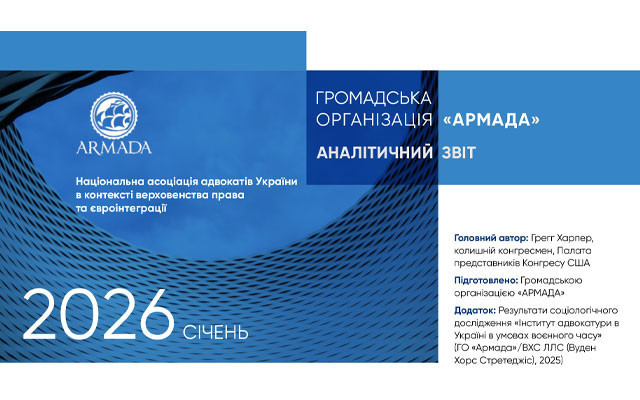
European integration
A translation of the report on advocacy presented to the European Parliament has been published
A translation of a research report on the Ukrainian advocacy profession in wartime, previously presented to the European Parliament in Brussels, has been published. The document is presented as a basis for discussion on the rule of law, Ukraine's European integration aspirations, and countering Russian disinformation in the legal sphere.
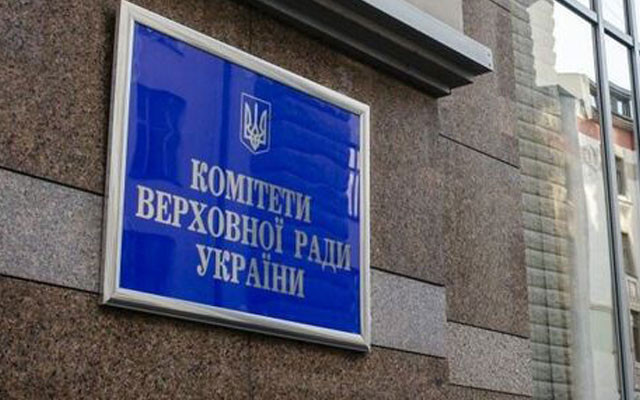
Legislation
The Verkhovna Rada Committee criticized the format of the government working group on advocacy
The implementation of the Roadmap on the rule of law (approved by Cabinet of Ministers Resolution No. 475-r of May 14, 2025) in relation to advocacy raises the practical question of who exactly should prepare legislative changes and how.
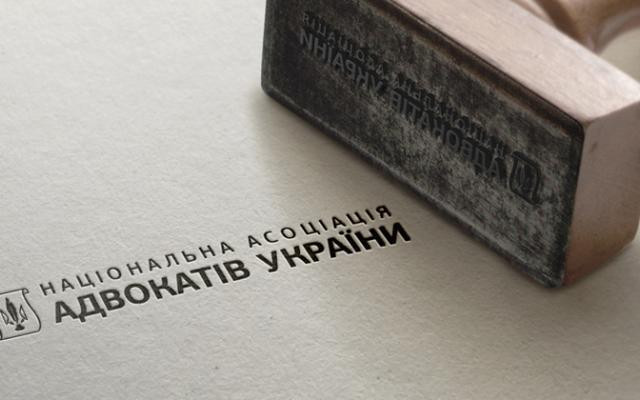
Self-government
The BCU demands a review of the composition of the government working group on reforming the advocacy profession
The President of the UNBA, BCU Lidiya Izovitova, appealed to the Cabinet of Ministers of Ukraine to review the composition of the working group on improving legislation in the field of advocacy and legal practice.
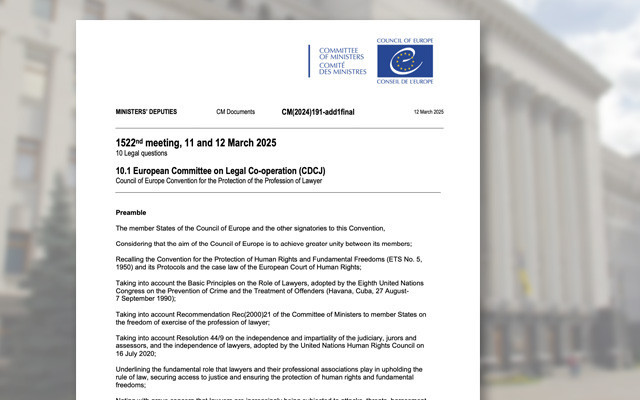
Guarantees of the practice of law
The President has determined, who will sign the Convention for the Protection of the Profession of Lawyer
President of Ukraine Volodymyr Zelenskyy authorized Ukraine's Permanent Representative to the Council of Europe Mykola Tochytskyi to sign the Council of Europe Convention for the Protection of the Profession of Lawyer.

Discussion
Why lowering the age of marriage lacks legal logic
Although until 2012 there was a provision in family law that allowed children to marry from the age of 14 under certain circumstances, its return to Ukrainian law would contradict international obligations and the logic of criminal law.

European integration
Open dialogue between the UNBA and the European Commission on the path to EU
The Ukrainian National Bar Association held a working meeting in Brussels with Mr Wolfgang Nozar, Head of Unit for Governance, Rule of Law and Financial Assistance, Directorate-General for Enlargement and Eastern Neighbourhood (DG ENEST), European Commission.

Self-government
A report on Ukrainian advocacy was presented in the European Parliament
Can a shadow report on advocacy replace the political framework of the Roadmap on the rule of law with demands for the restructuring of self-government? Where is the line between accountability and the seizure of institutions? And how can we respond to narratives with data rather than impressions?
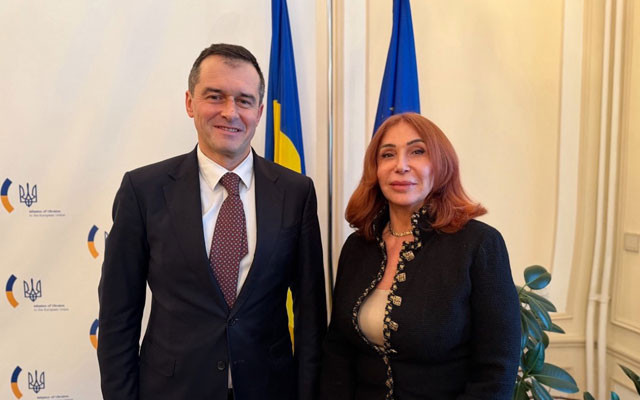
European integration
UNBA and Ukraine's representation to the EU have synchronized their priorities
On February 5, in Brussels, the President of the UNBA, BCU Lidiya Izovitova held a working meeting with the Ambassador Extraordinary and Plenipotentiary of Ukraine, Representative of Ukraine to the European Union Vsevolod Chentsov.
Publications

Volodymyr Matsko Extradition as a systemic form of rights violations

Victoria Yakusha, Law and Business The anti-corruption vertical cannot «take care» of the Bar as an institution, - acting head of the HQDCB

Censor.net Protecting advocates – protecting justice: addressing concerns about the new law

Ihor Kolesnykov A BRIEF SUMMARY REGARDING THE APPLICATION OF THE ORDER ON EXTENDED CONFISCATION IN LATVIA REGARDING FINANCIAL ASSETS OF…

Valentyn Gvozdiy WORKING IN A WAR ZONE

Lydia Izovitova Formula of perfection

Sergiy Vylkov Our judicial system is so built that courts do not trust advocates

Iryna Vasylyk Advocacy in the proclamation of Independence of Ukraine
